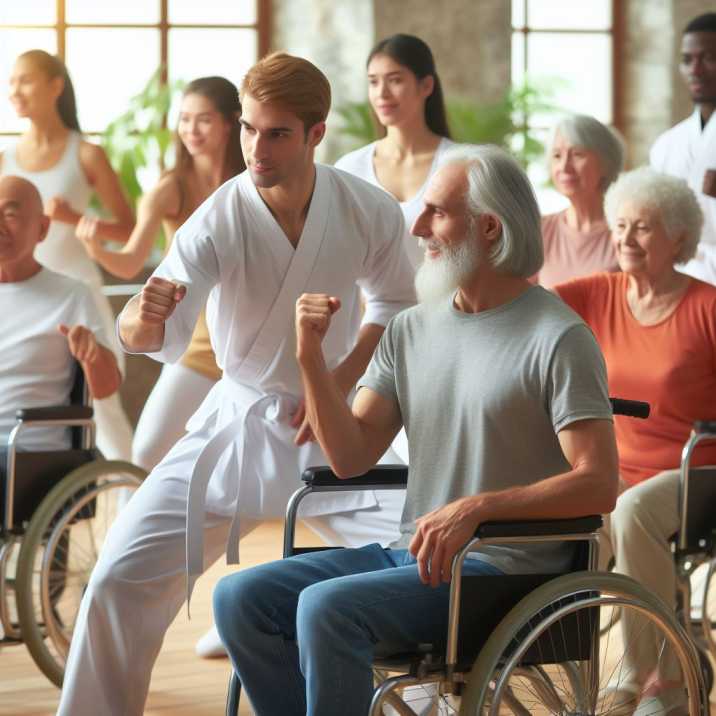Introduction:
Table of Contents
In this article, we delve into the question: Can Kung Fu be learned for rehabilitation purposes? Let’s explore the potential benefits of incorporating Kung Fu for rehabilitation purposes. In recent years, the exploration of alternative rehabilitation methods has gained significant attention. Among these methods, Kung Fu has emerged as a compelling option for individuals seeking physical and mental recovery. Originating from ancient Chinese martial arts traditions, Kung Fu offers a holistic approach to wellness that goes beyond mere physical exercise.

Understanding Kung Fu:
Kung Fu, also known as Chinese martial arts, encompasses a wide range of fighting styles and techniques. Contrary to popular belief, Kung Fu is not just about combat; it is a comprehensive system that emphasizes self-discipline, focus, and balance. Practitioners of Kung Fu engage in a variety of activities, including forms (sequences of movements), sparring, and meditation. The philosophy behind Kung Fu emphasizes harmony between the mind, body, and spirit, making it an ideal candidate for rehabilitation purposes.
Benefits of Kung Fu for Rehabilitation:
Physical Rehabilitation:
- Improved Strength and Flexibility: Kung Fu training involves a combination of stretching exercises and dynamic movements that enhance muscle strength and flexibility.
- Enhanced Coordination and Balance: Through precise and controlled movements, practitioners develop better coordination and balance, which are essential for rehabilitation from injuries or physical disabilities.
- Pain Management: Regular practice of Kung Fu can help alleviate chronic pain by promoting better posture and body mechanics.
Mental Rehabilitation:
- Stress Relief: The meditative aspects of Kung Fu, such as focused breathing and mindfulness, can help reduce stress and anxiety levels.
- Increased Focus and Concentration: Kung Fu requires practitioners to maintain a high level of concentration during training, which can improve cognitive function and mental clarity.
- Boosted Confidence and Self-Esteem: As individuals progress in their Kung Fu practice and achieve milestones, they often experience a sense of accomplishment and increased self-confidence.
Emotional Rehabilitation:
- Empowerment: Learning self-defense techniques in Kung Fu can empower individuals who have experienced trauma or abuse, helping them regain a sense of control over their bodies and emotions.
- Emotional Regulation: The discipline and self-control cultivated through Kung Fu practice can aid in managing emotions and developing healthier coping mechanisms.

Conclusion:
In conclusion, Kung Fu for rehabilitation purposes offers a holistic approach to physical, mental, and emotional well-being. From improving strength and flexibility to fostering mental clarity and emotional resilience, the practice of Kung Fu encompasses a wide range of benefits that can support individuals on their journey towards recovery. By embracing the philosophy and techniques of Kung Fu, individuals can not only rehabilitate their bodies but also cultivate a sense of empowerment and balance in their lives. Whether you’re seeking rehabilitation from injury, illness, or emotional trauma, consider exploring the transformative power of Kung Fu training.
FAQs (Frequently Asked Questions):
1. Can anyone learn Kung Fu for rehabilitation purposes?
- Yes, Kung Fu can be adapted to suit individuals of all ages and physical abilities. Whether you’re recovering from an injury or seeking emotional healing, Kung Fu offers a versatile approach to rehabilitation.
2. How long does it take to see results from Kung Fu training for rehabilitation?
- The timeline for experiencing benefits from Kung Fu training varies depending on individual factors such as consistency of practice, existing physical condition, and specific rehabilitation goals. However, many practitioners report noticeable improvements in strength, flexibility, and overall well-being within a few months of regular training.
3. Is Kung Fu safe for individuals with pre-existing medical conditions?
- As with any form of physical activity, it’s essential for individuals with pre-existing medical conditions to consult with their healthcare provider before starting Kung Fu training. Instructors can also modify techniques to accommodate specific needs and ensure a safe training environment.
4. Can Kung Fu training be integrated into existing rehabilitation programs?
- Yes, Kung Fu training can complement traditional rehabilitation programs by offering a holistic approach to wellness. Many rehabilitation centers and healthcare facilities now incorporate martial arts-based therapies, including Kung Fu, into their programs to enhance physical and mental recovery.
5. Are there specific Kung Fu styles that are more suitable for rehabilitation purposes?
- While various Kung Fu styles offer unique benefits, there is no one-size-fits-all approach when it comes to rehabilitation. Individuals can explore different styles, such as Tai Chi, Qigong, or Shaolin Kung Fu, to find the one that best aligns with their rehabilitation goals and preferences.


